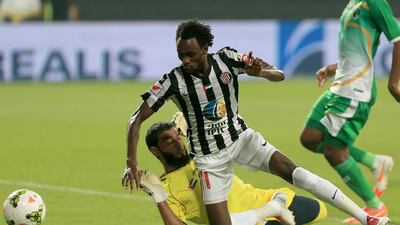ABU DHABI // Eric Gerets, the Al Jazira coach, was taking a lot of positives from the fact that his team scored three second-half goals to win 3-0 against Emirates on Thursday.
“When my players came in for the break, I told them no matter what they did, we must win these three points,” the Belgian said.
“I can’t say it was a sensational win, but winning the three points was what mattered at the end. And for the first time in three games, we didn’t concede a goal, which was another positive we can take from this game.”
Mirko Vucinic's performance would make anybody feel good. He found the net three times in a 13-minute span of the second half to blow open the game.
“My team woke up in the second half and they gave a good performance, for which I can be happy,” Gerets said. “This performance gave me a good feeling and I will look more positively for the next game.”
One mistake was all it took for Emirates to throw it away at the Mohammed bin Zayed Stadium last night.
They held Jazira for more than an hour, but they conceded a penalty when Abdulla Ali handled the ball, accidentally it seemed, when he went up to challenge a high ball.
Vucinic, a forward from Montenegro, stepped forward to fire the spot kick into the corner of the net as Abdualla Moosa, the Emirates goalkeeper dived in the opposite direction, breaking the deadlock.
Thereafter, the former Roma and Juventus striker, 30, was on target two more times in seven minutes.
He dispatched a neat volley on a left cross from Abdulla Mousa and completed the stirring hat-trick when he headed a right cross from Jonathan Pitroipa to seal game for Jazira.
“The penalty was the turning point,” said Paulo Comelli, the Emirates coach. “We made a few mistakes, and when you do that against teams like Jazira, we have to pay a heavy price for it.”
Jazira did everything well but score in the first half.
They enjoyed possession, territorial advantage and a solid passing game, yet failed to get past a gritty Emirates defence.
Ali Mabkhout had an excellent chance to break the deadlock after a flowing move that prompted a series of passes before it was slipped toward the Emirati international – only to see him strike a wild shot over the crossbar.
Emirates did what they were supposed to do – play defence. They made some inroads toward the Jazira goalmouth from counter-attacks, but they were more content in holding their more illustrious opponent.
Fujairah 0, Al Dhafra 0
A victory in the new Arabian Gulf League season remained elusive for both Fujairah and Al Dhafra after they played out a goalless draw on Thursday. The result makes it three draws out of three for Dhafra, while newly promoted Fujairah have two draws and a loss to show for their early endeavours back in the top flight.
It was Dhafra’s Makhete Diop who went closest to opening the scoring in a tight first half in Fujairah as he saw his close-range effort come back off the post and bounce to safety, with Ayyoub Al Marzouqi in the home goal beaten. Boubacar Saanogo almost broke the deadlock for the home side after the restart, when his volley went just wide from close range after he had found space in the Dhafra box.
Defences largely dominated again in the second half, but substitute Ali Al Hammadi hit the bar in the fifth minute of stoppage time as Dhafra came close to a last-gasp winner.
apassela@thenational.ae
Follow us on Twitter at @SprtNationalUAE


